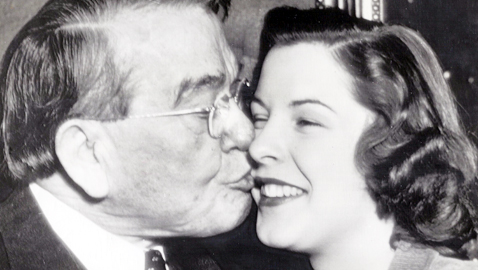Senator Kenneth McKellar had been overwhelmingly reelected to an unprecedented (for Tennessee) fifth term in 1940. It was during the decade of the forties that K. D. McKellar earned his reputation as a feudist and reached the peak of his influence and power. There had been occasional flashes of the McKellar temper in previous years, notably when the senator had engaged in a feud with the Superintendent of the Great Smoky Mountains National Park, J. Ross Eakin. McKellar, who paid very close attention to communications from constituents, received numerous complaints about Eakin and came to believe the Superintendent was a partisan Republican and opponent of President Franklin Roosevelt. The most famous feud of McKellar’s Congressional career and one that tarnished his future reputation was with David E. Lilienthal, Chairman of the Tennessee Valley Authority.
Many historians have attempted to describe the feud between Senator McKellar and Lilienthal as merely a row over political patronage. All too often one is presented with a picture of the noble and faultless TVA Director being resistant to the demands and hiring recommendations made by an irascible and ruthless McKellar. As is almost invariably the case in such disputes, the genesis of the feud between McKellar and Lilienthal was a much more complex affair. McKellar was naturally proud of both the Tennessee Valley Authority as well as his own role in defending the agency from frequent Congressional raids; the senator also prided himself on his ability to continually provide funding for the TVA, oftentimes under extremely difficult circumstances. McKellar worked tirelessly to overcome opposition in Congress from Republicans, many of whom disliked the very concept of the Tennessee Valley Authority. There were a number of conservative Democrats who shared the same philosophy as Republicans and were more sympathetic to the private power interests than the TVA. Many of the fights over the Tennessee Valley Authority’s budget were intense and approval was secured inside the Senate Appropriations Committee by a single vote. One of the most often overlooked aspects regarding Senator Kenneth McKellar is the fact he was one of the very first members of Congress to support the concept of the Tennessee Valley Authority. From 1925 until 1929, Senator McKellar introduced no less than seven different pieces of legislation to transform the Muscle Shoals plant to a government-run project. None of McKellar’s bills were successful and when the Tennessean opposed Nebraska Senator George W. Norris’s bill in 1928, some concluded McKellar was hostile to the project. McKellar’s objection to the Norris bill was the Nebraskan’s refusal to accept an amendment to the bill that would have allowed the Federal government to reimburse counties in Tennessee for the property taxes lost on land that would be flooded.
McKellar would tell anyone who would listen his greatest disappointment during his entire Congressional career was President Franklin Roosevelt asking George W. Norris to sponsor the legislation creating the Tennessee Valley Authority. McKellar was quick to point out without providing the funds necessary to keep the TVA operating, there would have been no dams built. McKellar was frequently ahead of the TVA Directors who had been hesitant about building the dams at Loudon, Chickamauga, Guntersville, Watts Bar, and Gilbertsville. Senator McKellar was not the least bit hesitant about building any of those dams as he urged construction while the TVA Directors themselves dithered and only the Wheeler and Norris dams had been built.
McKellar did initially oppose construction of Douglas Dam due to the fact it would flood thousands of acres of rich farmland. Senator McKellar only dropped his opposition after a personal plea from President Roosevelt, who cited the war effort as making the construction of Douglas Dam imperative.
David Lilienthal shrewdly encouraged the belief McKellar was mad at not being able to fill jobs at TVA, but the truth is Senator McKellar would forthrightly reply to constituents interested in employment with the Tennessee Valley Authority that positions were under civil service and his own endorsement would have little or no value.
McKellar’s seniority in both the Senate and on the Appropriations Committee was absolutely vital to the TVA’s success in Congress, a fact acknowledged by no less than Albert Gore, Sr. who finally defeated McKellar in 1952.
K. D. McKellar was a highly sensitive man, easily offended and McKellar’s intense personal dislike of David Lilienthal originated due to the different personalities and temperaments of the two men. McKellar also came to believe, not without reason, that Lilienthal had not been truthful with him on more than one occasion and the old senator had a very low tolerance for individuals who toyed with the truth. McKellar himself, while always courteous to constituents, was plain spoken, if not actually outspoken. McKellar did not hesitate to tell constituents he did not agree with them and was not above responding to abusive letters in kind.
Eventually, McKellar’s dislike of David Lilienthal reached the point where the senator was not entirely rational on the topic of the TVA Director.
As a feudist, McKellar had few peers inside the Senate. Once convinced any person was corrupt, incompetent or a liar, McKellar was a positively relentless antagonist. McKellar was a skilled interrogator and frequently lulled unsuspecting witnesses into believing he was an ineffectual and sleepy old man. The journalist and later best-selling author Allen Drury was a cub reporter for the Associated Press in the early 1940s. Drury kept a personal journal, which was later published as A Senate Journal. Drury’s first impressions of the Tennessee senator are worth noting. Drury confessed to his diary McKellar was “a slow bumbling absent-minded typical Senator, likeable enough but a trifle slow on the uptake, well meaning, reasonably honest, shrewd but not in the way some people are shrewd.”
Drury’s assessment of Tennessee’s senior U. S. Senator was to undergo a rapid and significant change after that initial first impression. After watching one of McKellar’s performances on the Senate floor, Drury mused, “And this is the man I used to think was ‘not shrewd’.” Drury added, “Over and over again I am learning not to judge politicians at first glance.”
The young reporter continued to revise his opinion of Senator McKellar; after relating how McKellar had chosen a particular moment “with impeccable shrewdness” to bring to the Senate floor a Roosevelt measure to provide $30,000,000 for migratory labor, Drury admiringly concluded, “Old Mack brought a lot of know how out of the hills of Tennessee.”
Drury also recorded in his diary an exchange with Senator McKellar, who had been approached by reporters following a session of the Senate. They met McKellar on the Senate floor to discuss amendments the Tennessean proposed to place tighter controls on TVA’s funds. Drury expertly brought the scene to life, filling it with rich detail. One of the reporters noted that Shelby County Boss E. H. Crump had announced his personal opposition to the McKellar amendments and asked if it meant a break between the two old allies. McKellar replied, “Oh, no! Oh, no! Oh. No!” Drury wrote the Senator’s reply was made “in the hearty scoffing tone which implies the questioner is slightly touched.” As the reporters walked away from the interview, one journalist, himself a native of Tennessee, exclaimed, “He’s a devil, that McKellar,” and Drury observed the reporter’s remark was made with “grudging admiration.”
Allen Drury himself finally concluded McKellar was “at seventy-five years old,“ the toughest in-fighter in the Senate, shrewd, tricky, unscrupulous and ruthless – – – a feudin’ son of Tennessee.”
Even so powerful a President of the United States as Franklin Delano Roosevelt realized he had to contend with the Senator from Tennessee. FDR summoned Memphis Boss E. H. Crump to the White House for a conference and urged Crump not to support McKellar for reelection in 1946, saying the old senator could not be reelected in any event. Crump, who neither liked nor trusted Roosevelt, snapped back the President was wrong; Senator McKellar would indeed run and be reelected. Roosevelt, contemplating the hell McKellar would raise if David Lilienthal was reappointed, had decided not to send Lilienthal’s name to the Senate. Crump proved to be right and McKellar was reelected in 1946 and still remained in the United States Senate long after Franklin Roosevelt was in his grave.
The death of FDR had an unexpected benefit for David Lilienthal. Following Roosevelt’s death, Vice President Harry Truman became President and Truman, himself a former member of the Senate, as well as the Appropriations Committee, understood McKellar’s power inside the Senate. As there was no sitting Vice President, Truman invited McKellar to sit in on Cabinet meetings. For the first two years of the Truman presidency, McKellar was at the White House virtually every Monday morning. While McKellar considered Truman to be a friend, the President was evidently somewhat less fond of the senator. Even though FDR had concluded he would not reappoint David Lilienthal to the TVA Board of Directors, Truman nominated Lilienthal to serve on the Atomic Energy Commission, an appointment Truman knew would enrage McKellar. Truman predicted to an aide in his customary earthy language the nomination would cause McKellar to have “a shit hemorrhage.” The President was not disappointed by Senator McKellar’s reaction to his nomination of David Lilienthal.








